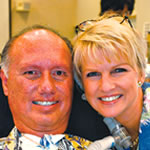We Can Learn A Lot From Charlie

Charlie and Lucy Wedemeyer: an unbeatable team
For a little more than three decades, Charlie Wedemeyer lived through a disease that was supposed to take his life just a few years after he was diagnosed with it.
ALS, or Lou Gehrig’s disease, changed Wedemeyer’s life forever, but he also changed many other lives in the process, including mine.
Growing up as a sports nut on an island full of sports nuts, I remember watching a guy on TV, in a wheelchair, with a tube going into his throat. But I also took notice of this blonde woman who stood by him and even managed to read his lips to relay messages to crowds of people.
At that time, I was too young to realize the many tremendous feats he accomplished on the playing fields, but later I would come to know that he was one of Hawaii’s best athletes of all time.
A multisport star at Punahou School, Wedemeyer would go on to earn a football scholarship at Michigan State, which at the time was one of the top football programs in the country. Before that, though, he would capture the very prestigious honor as the state’s prep athlete of the decade.
The epic 1966 game between the No. 1 and No. 2 college football teams in the country, MSU and Notre Dame – the very first live Mainland event televised in Hawaii, thanks to a new satellite dubbed Lani Bird – Wedemeyer was the holder for kicks (by the barefooted Hawaiian Dick Kenney) and made his home state proud. The “Game of the Century” ended in a 10-10 tie. With another Hawaii boy, Bob Apisa, playing fullback, Wedemeyer would help the Spartans capture the 1966 national title.
While he always dreamed of coming back home to the Islands to run his own hotel, Wedemeyer took a different path and settled down in San Jose, Calif., becoming a teacher and football coach at Los Gatos High School.
Six years later, he was diagnosed with Lou Gehrig’s disease and given just two years to live. But most of you know what transpired after his diagnosis.
This is when I began to follow his life through his movies, the Emmy-Award winning documentary One More Season and the made-for-TV flick Quiet Victory: The Charlie Wedemeyer Story. I began to play sports at this time, and when there were times I felt like quitting, I thought of Wedemeyer and his never-say-die attitude. I also admired his wife, Lucy, who wouldn’t let him quit.
I was amazed by their relationship and how they worked as a team, either at games or speaking engagements. She would read his lips as if it were her thoughts coming from her own lips.
I’ve never met Wedemeyer in person, but I’ve spoken to some of his family members and friends after he passed away earlier this month. They say he is now coaching up in heaven and still smiling, with that same great attitude.
Down here, though, he’ll be remembered as not only one heckuva athlete, but one heckuva person as well.
You must be logged in to post a comment.




There are no comments
Add yours